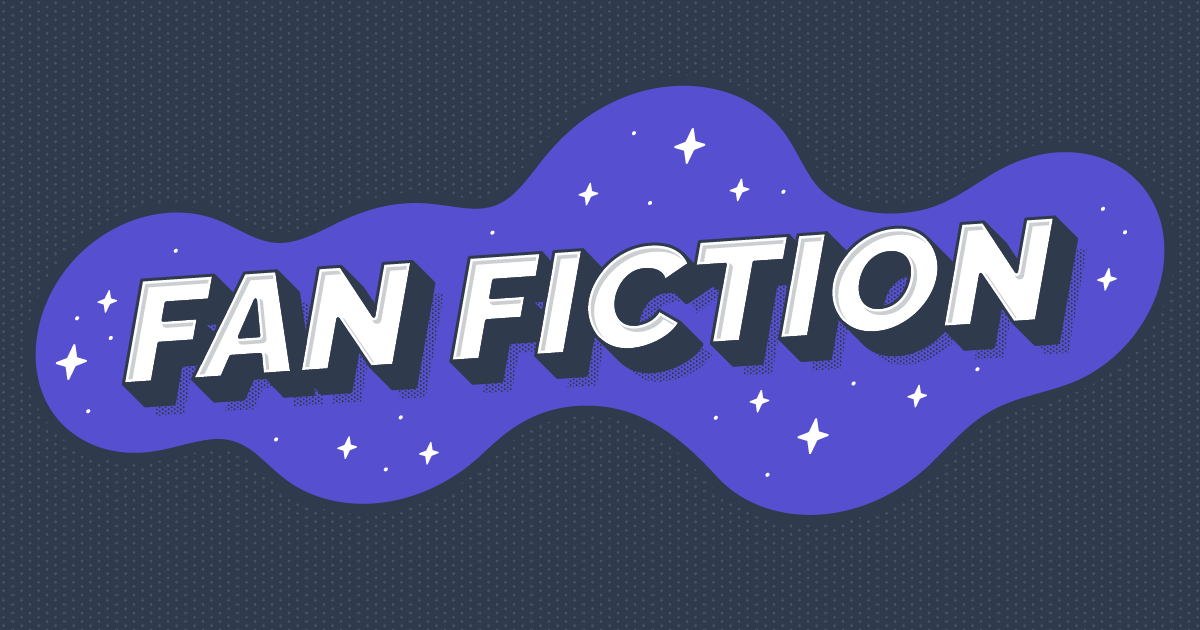What Is Fanfiction and Why Does It Matter?
Or, What is Fanfiction, How is it Relevant, and Why is it Illegal to Print it (Publicly or Privately) Using Lulu?
In the year 2021, with the ever-growing popularity of the internet, fandom, and other aspects of nerd culture that were previously kept behind closed doors, you have probably heard of fanfiction.
Most notoriously, the best-selling book of the last decade (no, really) E.L. James’ Fifty Shades of Grey started its life as Twilight “AU (alternate universe)” fanfiction. Similarly popular, though more tangentially related, is Anna Todd’s After series, formerly One Direction “OC (original character)” fanfiction. Perhaps you remember hearing buzz about Cassandra Clare’s The Mortal Instruments series originally being Harry Potter fanfiction, back in the day. Or, if you’re really an internet veteran, you may recall reports of Anne Rice suing fanfiction authors as far back as the nineties and early aughts.
Unfortunately for fanfiction – and fanfiction authors and readers – it tends to only make the news for scandalous reasons. Which is a shame, because fanfiction can be an incredible outlet for creativity, catharsis, and community. And while it has become more popular, fanfiction authors still have plenty of hurdles left to jump. In 2019, Archive of Our Own, an online fanfiction database, won the Hugo Award for Best Related Work, which was kind of a big deal (yes, I am a Hugo Award winner, thanks so much).
But What Is Fanfiction? And Why Do People Write It?
I’m so glad you asked. Fanfiction, for the uninitiated, is the process of writing original stories using the characters, plot points, and universes already invented by other creators. Fanfiction – also known as fanfic, or simply fic – can take many forms, and serve many purposes, often dependent on the original source material in question.
In order to really talk about fanfiction, there are probably a few terms you need to know:
- Canon – the details accepted as “officially” part of the original source material.
- Alternate Universe / AU – a story that takes place in a different “universe” than the one that the canon plot exists in.
- Canon Compliant – fanfiction that fits into the pre-existing universe, usually episode tags or fics that are continuing a plot point that has not been resolved by canon yet.
- Canon Divergent – fanfiction that, unlike an AU, originated in the source universe but eventually deviated from the canon plot. Canon-compliant fics can eventually become canon divergent.
- Shipping / Ship – rooting for two characters to wind up in a romantic relationship together or otherwise acknowledge their attraction to each other.
- A “ship,” as opposed to the action “shipping,” is a popular pairing of characters that fans are invested in seeing together. Frequently represented by a slash between the two character’s names or portmanteaus of the two characters, ie. Braime (Brienne/Jaime from Game of Thrones), Destiel (Dean/Castiel from Supernatural), or Supercorp (Kara Danvers/Lena Luthor from Supergirl).
- Episode Tag – can also be referred to as codas or missing scene fics, episode tags are short fics that are written expressly to explore, expand upon, or react to a specific moment in an episode or chapter.
Maybe the easiest way to answer the question “What is fanfiction” is to answer the question “Why is fanfiction?” At its most basic level, fanfiction exists to fill a void left by canon. What that void is, specifically, can vary dramatically, but most (not at, but an overwhelming majority of) fanfiction can be boiled down into one of three major intents:
Speculation on What’s To Come
That cliffhanger was brutal, wasn’t it? And now you have to wait, like, at least another year before you can find out what happens next? Not in fanfiction, you don’t. When a series is incomplete and fans are impatient for the next installment, ambitious authors will try to explore what they think will happen next in the story.
Speculation on “What If?”
What if Luke had been raised as the Prince of Alderaan and Leia raised by moisture farmers on Tatooine? What if none of the Avengers had superpowers and instead were all students at a Mean-Girls-esque high school? What if the Stranger Things kids went to Hogwarts (seriously, I challenge you to find any fandom that doesn’t have at least one Hogwarts AU)? Speculative alternate universe – AU – fanfiction primarily explores what would happen if we took beloved characters and dramatically (or subtly) changed their circumstances.
Speculation on What Could Happen (or Could Have Happened)
The most catch-all of these three buckets, what could happen (or could have happened) differs from the other two in the content that it explores. While “what’s to come” is almost always canon-compliant (until, of course, it gets replaced by actual canon, or “jossed”) and “what if” is almost always alternate universe, “what could happen” is usually canon divergent or, if you want to get technical, canon adjacent. “What could happen” fics can include things like episode tags that explore a scene that happened off-screen, the aftermath of a Big Event, or an exploration of how That Ship That Everyone Ships finally gets together. “What could happen” fics, in particular, tend to delve into the character-driven, emotionally-driven plot moments that often get lost in large, ensemble casts and action-driven canon.

Your Free Lulu Account
Create a Lulu Account today to print and publish your book for readers all around the world
Exploring the Real Why
Ultimately, the real “why” of why people write fanfiction is difficult to answer. I believe if you polled 100 fanfiction writers and readers and asked them why they write/read fanfiction, you would get 100 different answers. In fact, I think you could ask one author why they write/read fanfiction and you would get a different answer for every distinct fandom they participate in.
Sometimes I turn to fanfiction when I think showrunners have betrayed good characters with mediocre plots. Sometimes I turn to fanfiction because I know the ships I ship will never be canon, but at least this way I’ll get some kind of satisfaction. Sometimes it’s because I love a set of characters so much that I’m not willing to part with them once canon has run its course. And hey, honestly, sometimes it’s because it’s a whole lot easier (and cheaper) to find accessible reading material for free online when I’m in the mood for a 10k hurt/comfort episode tag where there’s only one bed.*
*a 10,000-word fic where the two characters I ship wind up comforting each other after the events of a particular episode or chapter, presumably in a scenario where they are forced to share a bed/room for Reasons.
How Is Any of This Relevant?
Fanfiction in Literature
Fanfiction has always been relevant in literature, long before it was even recognized as its own medium. Don’t believe me? The Divine Comedy is self-insert Bible fanfiction. Virgil was commissioned by Augustus Caesar to write The Aeneid as a spin-off fic from The Iliad, exploring the minor character Aeneas. Pretty much any version of the King Arthur legend that came after Le Morte d’Arthur, including, of course, The Once and Future King, is someone else’s hot take on Arthurian legend.
Perhaps most famously of all (but secretly so): The Three Musketeers. According to the introduction written by Alexandre Dumas himself, Dumas was inspired while reading Mémoires de Monsieur d’Artagnan, a novel by Gatien de Courtilz de Sandras, and wanted to explore what other adventures those characters got up to.
One could also argue that retellings, origin stories, and modernizations are also a form of speculative fanfiction. Really, what is Clueless if not the answer to the question “what if Emma took place in Beverly Hills in the nineties?” What is Sherlock, or the more recent Enola Holmes, if not speculative “what if” of Sir Arthur Conan Doyle’s famous detective stories? What on Earth does Leonardo da Vinci have to do with Cinderella? Absolutely nothing, but apparently someone decided that a crossover fic (combining two unrelated canons or characters into one story) was necessary and Ever After was born. How, exactly, is saying “I’m going to take the Justice League and write them all as normal humans” any different than Percy Jackson, American Gods, or the hundreds of other books exploring the gods of various pantheons? And don’t even get me started on Hamilton or Harry Potter and the Cursed Child.
But beyond the point that fanfiction has always been relevant in literature, these days it has become more intrinsically tied to publishing than ever before. And I’m not even talking about the fact that authors now get commissioned to write officially-sanctioned fanfiction for major franchises like Star Wars, the Marvel Cinematic Universe, and D.C. Icons.
Fanfiction in Publishing
While fanfiction has existed long before the internet, its popularity has undeniably skyrocketed since online databases like Archive of Our Own and its predecessor Fanfiction.Net have made it that much more accessible. And with the rise of epic series that take years to come to their canon conclusions – and often leave many stones unturned – more and more young writers turned to fanfiction in the gaps between Harry Potter books or Game of Thrones seasons.
The thing is, reading fanfiction is a gateway drug. You read enough fic and you’re bound to get inspired to write your own. You write enough of your own and you start developing your craft, practicing your style, flexing your writing muscles. It’s a short jump from a “what if” fic with a highly original plot that just happens to use existing characters to just diving right into that original plot with original characters. And suddenly, before you know it, there goes a whole generation of former fanfiction writers that are now publishing fantastic works of original fiction.
More and more fiction authors are speaking up about getting their start in fanfiction. Multi-time New York Times bestseller Christina Lauren is a romance-writing duo that got their start writing Twilight fanfiction. Award-winning Sci-Fi Fantasy author Naomi Novik isn’t just open about her history writing fic – she’s also partly responsible for Archive of Our Own, one of the largest fanfiction databases on the internet. Marissa Meyer, Cassandra Clare, and Rainbow Rowell – all prolific YA authors – have shared their love of fanfiction openly and in their work. Neil Gaiman, of course, refers to his A Study in Emerald in the tweet shared above. The Outsiders author S.E. Hinton has tweeted about writing Supernatural fanfiction, and The Magicians author Lev Grossman has openly posted his How to Train Your Dragon fic on his own website.
All of this to say, really, just this: fanfiction already exists in publishing. And it has already been inspiring writers for years and years, and likely will continue to do so for years and years to come.
How Is Any of This Relevant to Self-Publishing?
Fanfiction and self-publishing – particularly the “no-minimums print-on-demand” style of self-publishing we do – have both seen a rise in popularity over the last few years, so it makes sense that they would eventually catch wind of each other. In particular, we have seen an increase in authors and readers publishing fanfiction – whether for public resale or just for private use – using Lulu.
Unfortunately, whether you’re publishing your own fanfiction to sell on our bookstore or ordering a printed copy of your favorite fic for your bookshelf, using Lulu to print fanfiction is illegal.
Selling Fanfiction Through the Lulu Bookstore
For as prevalent as it is in and around modern publishing, fanfiction has always had one major downside: it skirts the edges of copyright infringement. Presently, publishing fanfiction online is considered legal in the United States because it is “noncommercial distribution.” In other words, when you post fanfiction on AO3 or another ad-supported, free-to-use site, nobody is making any money from the actual intellectual property itself.
However, once a piece of fanfiction has been published for sale on the Lulu bookstore (or any other online retailer, for that matter) it has crossed the line into “commercial distribution,” which is a copyright infringement and is illegal. In other words: if you are selling, for-profit, derivative work of copyright-protected material, you are breaking the law.
The exception to this rule is work inspired by any piece of media that is a part of the public domain. Published work can enter the public domain once the copyright has expired (or, of course, if it was never copyrighted in the first place).
Because Lulu is an open platform for any and all authors to publish their work, we do not have filters that review content before it is published to our bookstore. However, should we come across content that breaks copyright law, we will immediately remove it from our site and cancel any pending orders.
Printing Fanfiction for Private Use
This is arguably the most often misunderstood part of copyright infringement, at least for how it relates to fanfiction and self-publishing. There has been a recent uptick in fanfiction readers ordering individual print copies of their favorite works to add to their book collections.
As both a long-time fanfiction writer and a reader with an absurd book collection, I completely understand this desire. I would probably cry if a reader ever told me they wanted a print copy of my fanfiction, and I could easily fill a whole bookcase with beloved favorites that I read and reread. But unfortunately, printing copyrighted work for private use is still copyright infringement.
What it all boils down to is profit. If anyone other than the copyright owner makes a profit off copyrighted work, without the permission of the copyright owner, it is copyright infringement. And even if you are printing the work for private use, not selling it, we are still making money off it. Lulu makes a small profit off every book we print, which means even a book printed for your own personal use is not completely profit-less.
Also, not for nothing, but some interpretations of copyright law suggest that fanfiction authors themselves have a certain amount of copyright claim over their intellectual property. So really, if you’re following the letter of the law, if you’re printing fanfiction that wasn’t written by you, you’re committing two separate types of copyright infringement at the same time.So What Can I Print?
If you’re publishing any kind of derivative fiction – fanfiction, retelling, modernization, gender-swap, alternate universe, etc. – that is inspired by source material within the public domain, you are free to print and sell (or just print) your work.
If you are printing any kind of derivative fiction – fanfiction, retelling, modernization, gender-swap, alternate universe, etc. – where the original work is still protected by copyright, you can not print or sell your own copies.
If you are uncertain about whether or not your work is infringing upon copyright law I would highly encourage you to look into the origin and copyright details of the original inspiration for your book. A quick Google search should turn up the most up-to-date information. We’ve also talked about Copyright Law Basics for Authors on the blog before (though that does touch more upon protecting your own work).
Ultimately, I will advocate for fanfiction for the rest of my life, both professionally and personally. I think it’s an incredible outlet that inspires community, creativity, and talent. I think it’s an irrefutable part of both literary history and the modern publishing industry, and I think it has a long future of staying relevant. I hope to see more and more authors owning their origins as fanfiction writers and leaning into their existing online communities when they branch out into exciting new original fiction opportunities. However, when it comes to using print-on-demand to sell or print copies of your favorite fics: don’t.




